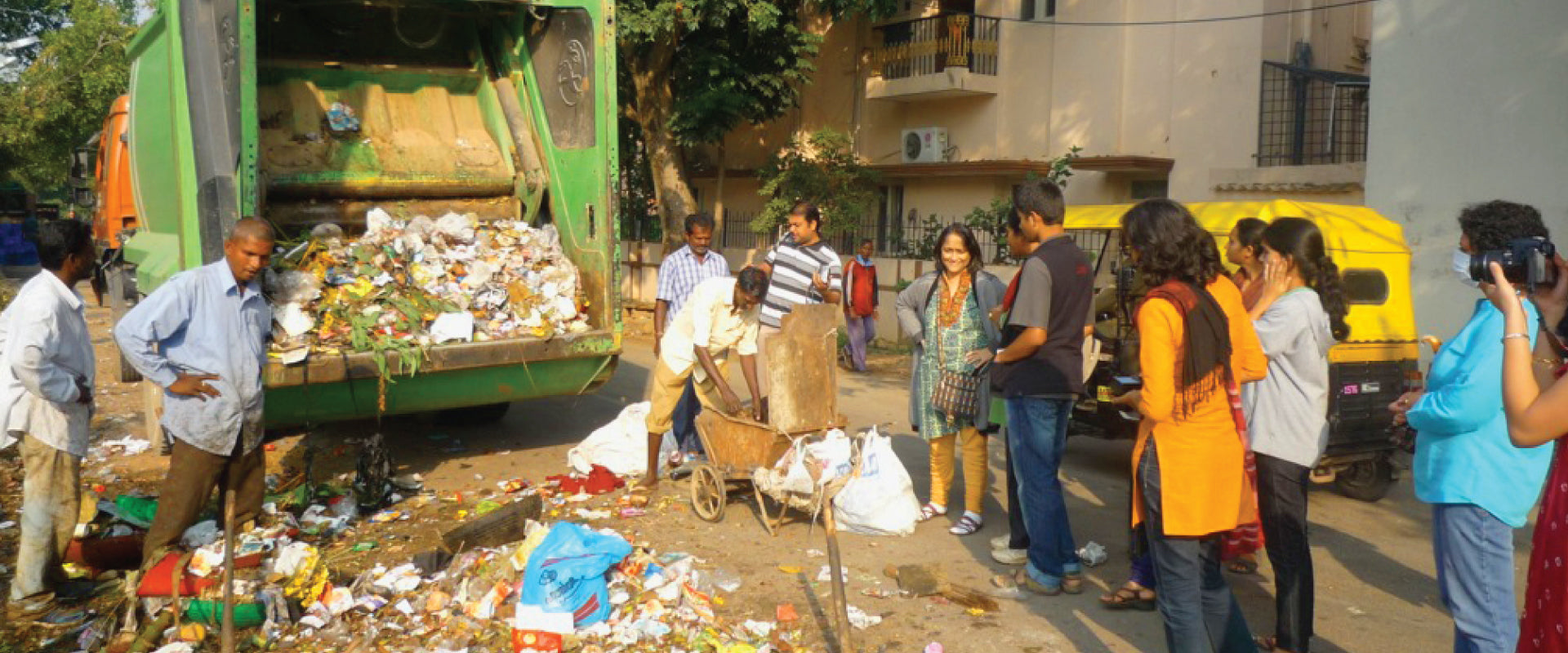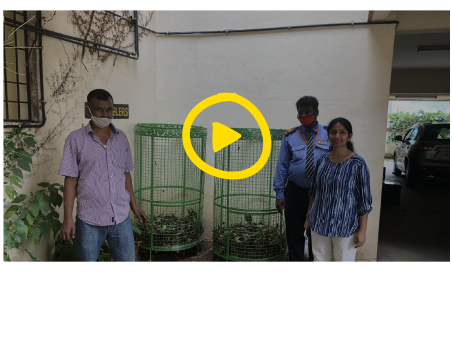Community Composting – an unnecessary fad or a real need?

Is it harder to implement composting in an individual home or in a community? What do you think?
One would think that it would be more efficient and easier to compost in a community. And communities would be eager to collectively compost, but this is not what motivates communities at all. They do know that doing it together is more convenient and efficient, their objections come from other real constraints.
The following factors impact this decision.
-
The policy around responsibility of waste management in an urban space
-
The infrastructure which the community occupies.
-
The budget available to the community for common work.
-
The human resources available to the community
-
The community’s interest in waste management
Who is responsible for waste in our cities?
In 2012-13 the Bangalore Municipal Corporation put forth a new notification on waste management for apartments – it labeled them “Bulk Generators” and mandated in-situ composting. There was a big push back from citizens:
“It means that any apartment with more than 10 housing units is solely responsible for handling its own solid waste and should have composting units to process the waste internally. Apartment owners now must worry about installing and maintaining waste processing units, mainly due to an inconsiderate plan that has been cooked up overnight!”
~Excerpt from a blogpost on Apna Complex - a community services platform
The norm so far was that waste management was the mandate of the municipality – the new rule made citizens re-visit the basic question – So who really is responsible for waste management in a city?
Rules set by the Ministries of Urban Development and Environment and Forestry, state that the Municipality of cities should collect domestic, institutional and trade waste from the source, from every door or through a community bin.
SWM (Solid Waste Management) rules of 2016 call communities to implement waste segregation. They don’t mandate in-situ composting for apartments – while they recommend apartments compost, they state that if they cannot, then it is still the Municipality’s responsibility to manage the organic waste generated properly. But in many instances the Municipality has levied fines based on a notice from the commissioner and not by rule passed by the corporation, which makes it seem high-handed and illegal and apartment associations are upset.
Currently citizens have the law on their side and can push back, but the pressures faced by municipalities include shortage of landfill area, increased distance to landfills as cities grow, fuel costs for transporting waste (organic waste is 70% water and it’s a shame to make it travel) and lack of segregation by waste generators.
These pressures are not going to become better – so something must change.

In my mind, zero-discharge will become the law for built infrastructure very soon, then communities of all kinds will have to treat all sewage on site and compost on site.
Since water is higher on our collective priority list, innovative sewage treatment plants will emerge and there will be adequate technology at different price points available for builders to implement. That eco-system is even now more robust than the decentralized waste management eco-system. We are willing to pay more for clean water as communities, and waste gets a least amount of budget allocated to it. This does not help create a marketplace for new solutions and the aspiration of folks to have a “ai” enabled system is hampered by what customers are willing to pay. This lack of “perceived value” will hold back the ideal of zero-discharge urban communities.
In addition, if everyone was mandated to make compost on site, what will we do with all the compost we make?
How will it reach farmland, since making it comes at a cost, shipping it out will only add to its cost and at the end of the line there are no buyers for it. Communities need to recover the investment in creating and shipping this, otherwise the zero-discharge rule on organic waste will never actually be implementable.
Do we need to build differently to help zero discharge to be the normal?

Yes emphatically – we need to plan our cities and our housing keeping in mind that discharge is a flow – and the flows start and end and need to loop up in our current urgency to conserve and regenerate resources.
We do not have spaces for waste allocated in our plans when we lay out neighborhoods – builders do not allocate spaces for waste in housing or commercial projects that are adequate in capacity and designed to aid waste segregation and recovery. Architects and Builders are only now beginning to acknowledge that there are many details and stakeholders involved that have been overlooked in our urban and housing planning. But since waste is way down everyone’s agenda during planning, more attention is diverted to “smart buildings” or modern amenities forgetting that creating circular flows is not only modern but future ready. This is first, a mindset challenge. Unless a large section of our urban population wants this, it’s not going to happen, it will be relegated to the small minority of “environmentalists”.
Let’s take for example the Government rule that unless there is a working Organic waste convertor (of any type) the building will not get clearances. In principle the Government has done its bit, on the ground another story plays out. Builders allocate a “space” for waste on their plans, hurriedly install a product to get the clearance, and are not really worried about whether the space or product is suited for the size of the community. It’s therefore not a surprise that often the product and process fails, leaving the association members frustrated and worse, turned off composting forever. Like one upset member said, “We have burnt our fingers on composting, we refuse to try a new way of doing it”.
Citizens feels that Government is abdicating its responsibility
Asking citizens to take responsibility of waste in addition to their community maintenance costs is not easy. They already have to a lot on their hands, their STP plants, solar, electricity, water harvesting, housekeeping, landscaping, swimming pool and other amenities. All of these are seen as critical, waste is not part of their mandate.
Some older communities do not have space for in-situ composting, others do not have housekeeping personnel to manage this process and still others do not have the budget to implement this. These are real barriers; therefore, the reality is that while in-situ composting is ideal, it is not implementable in many places.
While COVID set this whole idea of in-situ composting on the backburner just two weeks ago the municipality renewed its efforts to implement this rule. To communities today the idea of “Polluter pays” is seen as an abdication by the government of its job. They feel that this should apply only to commercial enterprises and not to residential spaces. This is despite many progressive case studies of apartments who have demonstrated that composting in-situ and segregation is possible and even rewarding for its community members. I have seen so many great examples of associations and evangelists who have championed in-situ composting and demonstrated its economic and environmental benefits.

As a nation we are still young when it comes to urbanization and this is an opportunity for us not to make the mistakes of older cities – take for example New York – a study showed how the plan at that time does not serve the needs of today to close the loop on resources.

So, no, composting in-situ is not a fad, it’s a necessity that needs much more collaborative work to get the most benefits from doing it. We need Builders, Urban Planners, Policy Makers, and Citizens to work together to find new ways to create ways for regenerate, recycle and reuse resources while saving costs on energy and emissions and creating well-being and jobs. Compost is really a wonderful material, and in some countries, it is used for lining the sides of lakes, bunds, highways, and to regenerate fallow spaces, while creating green jobs.
As you compost individually or in a community – keep spreading the word, only if this becomes cool and aspirational will more and more people align to make efforts to find new solutions. Get your kids excited about this wonder material, its tangible throbbing life changes are a symbol for life itself.
Poonam Bir Kasturi
March 02, 2022
Bangalore
External links and references used in post:
http://blog.apnacomplex.com/2013/07/25/bad-move-bbmp-why-apartment-residents-cant-process-the-community-waste/
https://www.thenewsminute.com/article/bengaluru-civic-body-imposes-rs-32-lakh-fine-apartments-not-composting-garbage-113596
https://timesofindia.indiatimes.com/city/bengaluru/bengaluru-apartments-slam-bbmp-over-composting-penalty/articleshow/72445599.cms?frmapp=yes&from=mdr
https://www.newindianexpress.com/cities/bengaluru/2019/apr/13/saddled-with-too-much-compost-apartments-in-bengaluru-now-seek-government-help-1963624.html
https://savitahiremath.com/2018/02/20/24-hr-composters-theres-no-microbe-in-this-universe-that-can-colonise-in-24-hrs-says-scientist-dr-manoj/
https://drive.google.com/file/d/18DXR1nut5cdN7Gjs7PXvfCyadQzKsMIK/view?usp=sharing
https://www.zerowastedesign.org/03-collection-and-urban-design/c-collection-urban-design-case-studies/





